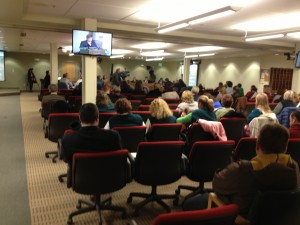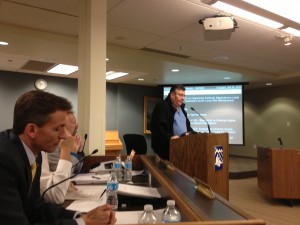After weeks of number crunching, the Anchorage School Board unanimously passed a budget on Thursday night.
It cuts $23 million and 200 positions. More than a dozen people testified about the cuts. Then the board made small changes that will make a big difference to the community.
Superintendent Ed Graff started out the meeting by suggesting that the board do something student and parent groups had been pushing for.

“I would like to request consideration from the board that you proposed an amendment to the budget that would postpone the 7-period schedule change in our comprehensive high schools, ” Graff said.
He asked them to stick with a six period schedule. In addition, Graff recommended adding 16 high school teaching positions back into the budget. But the money for both changes would have to come from district savings.
ASD is in it’s fourth consecutive year of budget cuts due to funding from the legislature that does not keep up with inflation. The legislature is considering Governor Sean Parnell’s recommendation that the base student allocation be increased by 200 dollars over three years about one percent per year. If passed, it will take some pressure off the district. But not enough say officials and many teachers and parents who testified at the meeting.
Several people praised the superintendent for his recommendation postpone the 7-period schedule.
“In my 18 years as a teacher I have never seen such unified and profound disapproval among the education community and students and I applaud your decision to reject this idea,” Laura Kimmel said.
Austin Baily, a student at West High School agreed, saying he was concerned compressed class periods could impact learning.
“Less face-to-face time and less time to do actual learning inside the classroom,” Baily said. “So I’d I would just like to call on your members to agree with what Mr. Graff said and at least postpone it for another year.”
Others testified about the importance of sparing English Language Learner Counselors, including self-described second generation Latino immigrant Jose Santiago who said he was concerned cutting ELL counselors could hurt graduation rates.
“Keep in mind that the ELL community for the most part occupy the lower levels of the economic ladders,” Santiago said. “Their the ones that have the most to lose. I was looking at your destination 2020, very lofy goals and you should be commended. But you have student body that is behind the 8 ball to begin with.”
After hearing testimony, the board made amendments adding the 16 high school teaching positions plus 3 high school counseling positions back into the budget. But they had to dig into their savings to do it, suspending a longtime policy that insured the board keep a minimum of 8 percent of funds in savings.
None of the School board members seemed happy about having to tap into reserve funds. Board member Natasha Von Imhoff said taking the money with no commitment from the legislature to increase funds made her nervous.
“In the event that we don’t get significant money and we go below our fund balance, what’s gonna happen next year,” she said.
Other members concurred but said adding back teachers and counselors was critical to serving vulnerable populations. The 16 teaching positions spared will be for classes helping students who are at risk of not graduating. The 3 counseling positions saved will likely be English Language Learner counselors.
School Board officials say the funding they’re getting from the legislature is not enough to keep up with costs. And they want a long-term solution in the form of an inflation-proof formula for funding Schools. School Board Chair, Tam Agosti-Gisler.
“I’m hoping that we can get beyond this funding crisis and find solutions in this state to do what we are constitutionally mandated to do and that is to fund education so that this board can dedicate its energies to supporting this administration to make the innovations that are required, that are needed in our global economy,” Agosti-Gisler said.
The board still plans to cut 200 positions. 143 of those are teaching positions. 20 are instructional support positions which includes counselors. The rest are mostly administrative positions.
The Anchorage School District 2014-2015 budget is $743.449 million, slightly less than last year’s. The budget now goes to the Anchorage Assembly for approval.
Daysha Eaton is a contributor with the Alaska Public Radio Network.
Daysha Eaton holds a B.A. from Evergreen State College, and a M.A. from the University of Southern California. Daysha got her start in radio at Seattle public radio stations, KPLU and KUOW. Before coming to KBBI, she was the News Director at KYUK in Bethel. She has also worked as the Southcentral Reporter for KSKA in Anchorage.
Daysha's work has appeared on NPR's "Morning Edition" and "All Things Considered", PRI's "The World" and "National Native News". She's happy to take assignments, and to get news tips, which are best sent via email.
Daysha became a journalist because she believes in the power of storytelling. Stories connect us and they help us make sense of our world. They shed light on injustice and they comfort us in troubled times. She got into public broadcasting because it seems to fulfill the intention of the 4th Estate and to most effectively apply the freedom of the press granted to us through the Constitution. She feels that public radio has a special way of moving people emotionally through sound, taking them to remote places, introducing them to people they would not otherwise meet and compelling them to think about issues they might ordinarily overlook.




